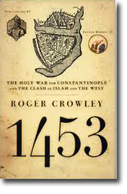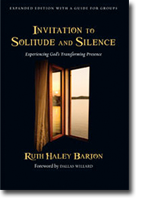Books!

Books that I Recently Enjoyed

1. The Insanity of God, a Story of Faith Resurrected by Nik Ripkin
This book explores what brings vitality to the persecuted Church around the world and what makes them resiliant even in suffering. The author writes:
"Suffering is one of God's ordained means for the growth of the church. He brought salvation to the world through Christ, our suffering Savior, and he now spreads salvation in the world through Christians as suffering saints."
This book has made me wonder if we are too addicted to being accepted and valued by the world, that we have lost our edge in the West. One pastor in the Eastern block gave them advice to the Western Church:
"Don't ever give up in freedom what we would never give up in persecution--and that is our witness to power of the resurrection of Jesus Christ!"
I found this book both convicting and challenging.

2. Chaos and Grace, Discovering the Liberating Work of the Holy Spirit by Mark Galli
Mark Galli explores the fact that change and transformation most often comes in the midst of chaotic events in history and in our lives. We pray for calm and peace but God does his best work when we experience just the opposite.
" ...we've forgotten the God of the Bible--the untamable, unruly, mysterious Spirit who regularly upsets our plans and, yes, sometimes creates havoc in our lives. We've become blind to this God, and when he works his chaos among us, we think it's either the devil or blind chance."

3. 1453, The Holy War for Constantinople and the Clash of Islam and the West by Roger Crowley
The author pieces together the events surrounding the fall of Constantinople in 1453. The Church was divided between East and West. The clergy lacked leadership. Add to this, gun powder became a game changer at a time when the walls of the city were never designed to withstand anything explosive. Crowley brings us to the scene as residents of this fabled city cried out to God for deliverance and at the same time prepared for the inevitable.
"Christianity was a rival monotheism with a matching sense of mission and desire to win converts. constantinople had defined the front line in a long-running struggle between two closely related versions of the truth that was to be pursued for hundreds of years."

4. The Harbingers, the Ancient Mystery that Holds the Secret of America's Future by Jonathan Cahn
Jonathan Cahn is a Christian rabbi who believe he has found in the events surrounding 911 parallels to prophecies in Isaiah 9. The harbingers of 911 were a warning to America to repent and turn back to God. But like the nation of Israel in Isaiah's time, these warnings are going largely ignored.
You may shake your head at all the connections Cahn makes between 911 and Isaiah 9, but it is a fascinating thesis. I have a greater understanding of how Israel could persist in its sinful ways, even with clear warnings and continue to slid toward destruction, because our nation also refuses to change even after the traumatic events of September 11th. It is the same hardness of heart.

5. Things Fall Apart by Chinua Achebe
This tale based in Nigeria, gives an inside view of African tribal culture and the influence of shame and glory on day-to-day life. It also at one point gives a view of the arrival of missionaries from the African perspective.
"The missionaries had come to Umuofia. They had built their church there, won a handful of converts and were already sending evangelists to the surrounding towns and villages. that was a source of great sorrow to the leaders of the clan; but many of them believed that the strange faith and the white man's god would not last. None of his converts was a man whose word was heeded in the assembly of the people. None of them was a man of title. They were mostly the kind of people that were called 'efulefu', worthless, empty men."

6. Invitation to Solitude and Silence, Experiencing God's tranforming Presence by Ruth Haley Barton
The busier my life becomes, the more I am drawn to the gift of solitude and silence. This book is like salt to a thirsty pallet. I makes me crave the water all the more.
"It is a fallacy to think that one just needs more time. Unless a deeper solution is found, 'more time' will just fill up in the same way as the time we already have. The way to liberation and rest lies through a decision and a practice.
The decision is to release the world and your fate, including your reputation and 'success,' into the hand of God. This is not a decision to not act at all, though in some situations it may come to that. It is, rather, a decision concerning how you will act: you will act in dependence of God. You will not take charge of outcomes. You will do your part, of course, but your part will always be chastened by a sense of who is God--not you!"

7. Oswald Chambers: Abandoned to God, The Life Story of the Author of My Utmost for His Highest by David McCasland
This book will stir your soul as you read about the life of one whose goal was to be "absolutely His." Here is a taste of the heartbeat of this servant of God:
"Holiness is not an attainment at all, it is the gift of God, and the pietistic tendency is the introspection which makes me worship my own earnestness and not take the Lord seriously at all. It is a pious fraud that suits the natural man immensely. He makes holy, He sanctifies, He does it all. All I have to do is come as a spiritual pauper, not ashamed to beg, to let go of my right to myself and act on Romans 12:1-2. It is never 'Do, do and you'll be' with the Lord, but 'Be, be, and I will do through you.' It is a case of 'hands up' and letting go, and then entire reliance of Him."
My All-Time Favorites

1. Theological Book: The Discipline of Grace: God's Role and Our Role in the Pursuit of Holiness by Jerry Bridges
This is Jerry Bridges' classic book on the subject of sanctification. What is God's part and what is our part? Dependence on God's divine work and the discipline to place ourselves under the influence of the Spirit are like the two wings of an airplane. It takes both wings for the airplane to fly. This is a very practical presentation of the doctrine of sanctification.
"Nothing cuts the nerve of the desire to pursue holiness as much as a sense of guilt. On the contrary, nothing so motivates us to deal with sin in our lives as does the understanding and application of the two truths that our sins are forgiven and the dominion of sin is broken because of our union with Christ."
"Preach the gospel to yourself every day."

2. Novel: Peace Like a River by Leif Enger
This is a story about a boy discovering faith as he observes it in his father. This faith is a strength that is of greater value than natural ability or great intellect. Reuben Land is a sickly child but he is blessed with eyes to see the miracles that surrounded his father's daily life. His father was a school janitor with a genuine friendship with his Lord. It is a faith that carries the family through tradegy. This story is beautifully written. I have read this book at least three times.
"Many a night I woke to the murmer of paper and knew (Dad) was up, sitting in the kitchen with frayed King James - oh, but he worked that book; he held to it like a rope ladder."

3. Classic: The Picture of Dorian Gray by Oscar Wilde
Dorian Gray was a handsome young man who was the subject of a painting. When he saw the painting, he saw it mocking him. The picture would stay the same and he would grow old and his beauty would fade. He wished that it was the other way around. Dorian gets his wish and his appearance doesn't change. Instead it is the picture that grows old. Though he sinks into debauchery, he maintains his youthful look. The picture on the other hand grows grotesque. At one point, Dorian grows tired of wicked life. He tries to reform and he discovers that even his attempts to reform are from selfish motives. He is trapped in his sinful nature.
This is a picture of our depravity. We can't free ourselves from the entanglements and bondage of sin. The only thing we can do is to throw ourselves on the altar of God's mercy and accept the grace that comes through Jesus.
"What is it all about?" cried Dorian in his petulant way, flinging himself down on the sofa. "I hope it is not about myself. I am tired of myself to-night. I should like to be somebody else."
C. Favorite Authors
When I look over the books on my Kindle reader, these are the authors that appear the most in my library:

1. CS Lewis
I am amazed by how many books (Christian and secular) that I have read over the last few years that quote CS Lewis. His writings illustrate so much of what we think about. CS Lewis had an uncanny way of exposing human nature and making complex thoughts simple so that we can interact with them.
My children's first notion of the love and majesty of Jesus came from the Lion of the Narnia stories. I have often said that you will never understand the genius of CS Lewis until you see deep theological concepts come to life in the eyes of your children as you read to them.
CS Lewis was a thinking man who was honest and engaging. He could hold his own in any circle of intellectuals. He didn't fit nice, neat evangelical boxes. His thoughts often took him to places that would make us uncomfortable. He said that Aslan was not a tame lion. In the same way, I would say that CS Lewis was not a tame writer.
What I admire most of CS Lewis was that he had the courage in the world of academia to speak of the things that mattered most to him--his faith in Jesus Christ.
"A man can no more diminish God's glory by refusing to worship Him than a lunatic can put out the sun by scribbling the word, 'darkness' on the walls of his cell."
- The Problem of Pain

2. Philip Yancey
I am amazed by how many books (Christian and secular) that I have read over the last few years that quote CS Lewis. His writings illustrate soPhilip Yancey asks the hard questions. He regularly puts everything on the table and doesn't settle for easy answers. I am drawn to authors that refuse to say exactly what I expect them to write. Yancey like CS Lewis fits this description.
I like very much Yancey's inductive style. Rather than telling us his conclusions at the outset of a discussion, he often walks us through his thought process and lets us draw conclusions with him at the end of the chapter.
In almost every book, Yancey makes reference to the book of Job. It is the story that he never fully gets over. Does God care when we suffer here on this "dirty tennis ball of a world." Yancey puts voice to our deepest fears, doubts and longings.
"Thunderously, inarguably, the Sermon on the Mount proves that before God we all stand on level ground: murderers and temper-throwers, adulterers and lusters, thieves and coveters. We are all desperate, and that is in fact the only state appropriate to a human being who wants to know God. Having fallen from the absolute Ideal, we have nowhere to land but in the safety net of absolute grace."
- The Jesus I Never Knew

3. Jerry Bridges
I have never met Jerry Bridges. I would like to someday. Still I consider him one of my spritual mentors. I eagerly begin one of his books and feel sadness when I turn over the last page. He has impressed on me the need to die to self and dare to let the Spirit work freely in my life. It is the grace of God that teaches us to say no to ungodliness.
From the Pursuit of Holiness, The Discipline of Grace, Transforming Grace, Trusting God, The Joy of Fearing God and others, I learned to appreciate the richness and mystery of my relationship with Jesus Christ. He has also taught me to set my mind on things above:
"When you can think about anything you want to think about, what do you think about? Do you think about your problems, or do you engage in mental arguing with someone else, or perhaps even allow your mind to drift into the wasteland of impure thoughts? Thinking is our most constant activity. Our thoughts are our constant occupation. We are never without them. But we can choose the direction and content of those thoughts."
- The Discipline of Grace